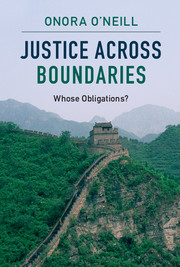Introduction
Published online by Cambridge University Press: 05 February 2016
Summary
Do good fences make good neighbours?
In his simple and deep poem Mending Wall Robert Frost imagines a dialogue with his New England neighbour about mending the crumbling drystone wall that separates their farms, where cattle no longer run. He points out that the wall is now not needed:
There where it is we do not need the wall:
He is all pine and I am apple orchard.
My apple trees will never get across
And eat the cones under his pines, I tell him.
His taciturn neighbour remains unconvinced:
He only says, ‘Good fences make good neighbours.’
Frost then poses questions that now animate many discussions of justice in a globalising world:
Spring is the mischief in me, and I wonder
If I could put a notion in his head:
‘Why do they make good neighbours? Isn't it
Where there are cows? But here there are no cows.
Before I built a wall I'd ask to know
What I was walling in or walling out,
And to whom I was like to give offence.
Something there is that doesn't love a wall,
That wants it down.’
Are walls and fences, borders and boundaries, needed for good relations and for justice? Or do they impose and perpetuate injustice? What violations are likely if they are no longer maintained? Can the ‘walling in or walling out’ that borders create and maintain be justified? Is the ‘mischief’ that tempts Frost to be rejected or embraced? Walls have been built and mended to exclude and include since time immemorial: walled cities and forts, garden walls and farm fences, the Great Wall of China, Hadrian's Wall, the Berlin Wall, the walls of apartheid townships and the West Bank Barrier (its very name disputed) all aim to ‘wall in and wall out’. But when and how do the exclusions they maintain make for a more and when for a less just world?
Boundaries and borders
We live in a world of innumerable structures that ‘wall in and wall out’, and in particular of countless boundaries and countless boundary crossings. The boundaries that we often think of as borders usually separate states or lesser jurisdictions, and for the most part form clear demarcations. Other boundaries are fuzzier. They include boundaries between societies and nations, between languages and religions, between ideologies and cultures, between ecologies and economies.
- Type
- Chapter
- Information
- Justice across BoundariesWhose Obligations?, pp. 1 - 10Publisher: Cambridge University PressPrint publication year: 2016

